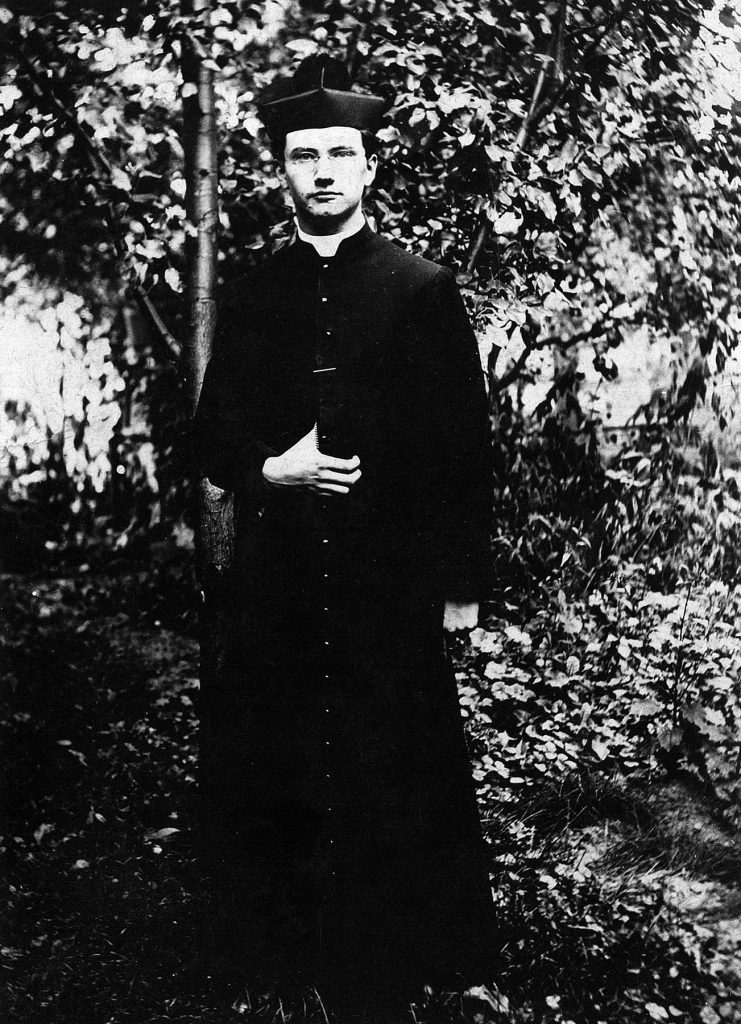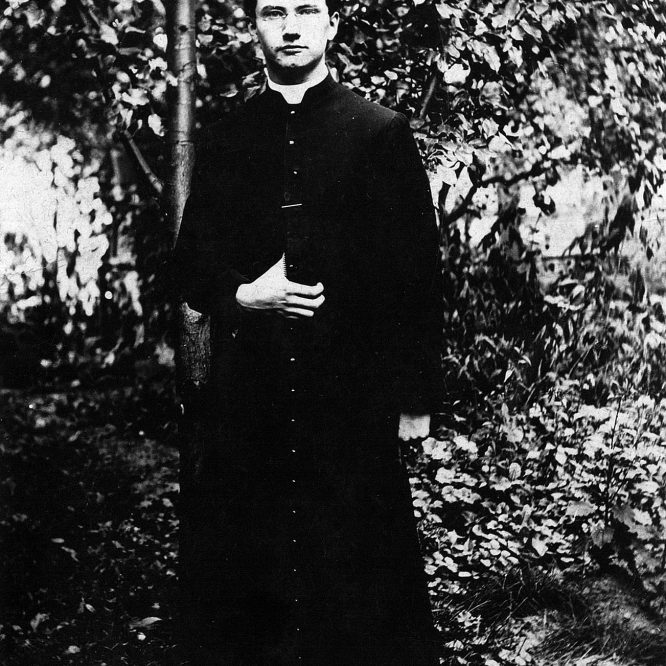Vol. 4, No. 41
October is Polish American Heritage Month, first celebrated in 1981 by the Polish American Cultural Center in Philadelphia. It is an opportunity to call attention to the accomplishments of the roughly 9.5 million self-identified Polish Americans in the United States. In Orleans County, the Poles found employment in the local sandstone quarries scattered along the Erie Canal, just as countless other immigrant groups had in prior years.
I was given this photograph of an unidentified priest several years ago and through a bit of luck was able to identify him as Rev. Leonard F. Dykal of Albion. Dressed in his cassock and wearing the liturgical biretta, the three-peaked hat common of Roman Catholic clergy prior to Vatican II, Dykal appears to be relatively young. I would presume that this image, printed on a postcard, was taken around or shortly after his ordination.
Leonard Dykał was born at Albion on April 30, 1889 to Frank and Mary Lubomska Dykał. He was baptized on May 1, 1889 by Rev. John Castaldi at St. Joseph’s Church on North Main Street and the sacrament was recorded under the name Leonardus Deco, an indication of the priest’s unfamiliarity with the Polish language. The “ł” in the Polish language sounds similar to the English “w,” which explains why the family’s name frequently appeared as Dykaw or Dikaw.
Leonard spent his earliest years living next door to his grandparents, Joseph and Mary Lubomski, and other members of his extended family. His grandfather spent the majority of his life as a laborer on the Erie Canal and his uncle, John Lubomski, would eventually become the manager of the Orleans County Quarry Company. The young Dykal received his education at the Polish parochial school before traveling to Detroit, Michigan to complete his undergraduate studies.
After returning to Western New York, he enrolled at St. Bernard’s Seminary in Rochester for several years and later transferred to Niagara University to complete his studies in Theology. On December 21, 1912, Dykal was ordained by Bishop Charles Colton at St. Joseph’s Cathedral in Buffalo and celebrated his First Solemn Mass the following week. On December 29th, Rev. Dykal was assisted by his classmate, Rev. Stephen Syczepanski, who served as deacon; Rev. Wojciech Cichy provided the homily. The celebration commenced with a parade led by the Polish Band and various church societies. The parade escorted Rev. Dykal from his parents’ home on East State Street to the rectory of St. Mary’s Church where he was vested before entering the sanctuary. A brief luncheon was held in the rectory following the service, Vespers were sung at 3pm, and a supper was held at the family home in the evening.
In 1914, Rev. Dykal was sent to assist Rev. Ladislaus Hordych at Assumption Parish in Buffalo’s Black Rock neighborhood. His tenure at Assumption was short as he was appointed to assist at St. Casimer’s in Buffalo and then St. Adalbert’s before leaving Western New York due to poor health. Dykal traveled south to Texas where he settled as the priest at St. Stanislaus Church in Chappell Hill in January of 1917. Within six months, he was sent to Brenham, Texas where he remained for seven years. During his tenure at Brenham he served as the pastor of two congregations, one English-speaking and the other Polish-speaking. He successfully merged the two congregations together and led the parishioners through a $50,000 school construction project while effectively reducing the parish debt to $10,000. When he was transferred to a parish at New Waverly, Texas, both Catholic and lay residents petitioned the Bishop of Galveston to reconsider the decision.
In September of 1927, Bishop Turner of Buffalo appointed Dykal to serve as administrator of Sacred Heart Church in Batavia following the illness of Rev. Leonard Podlewski (another Polish priest with local connections). After short stints at parishes in Humphrey and Franklinville, he was assigned to Sacred Heart Church in Medina to replace Rev. Charles Mioduszewski, where he remained until 1938 when he was replaced by Rev. Maximillian Bogacki.
Rev. Dykal was a well-educated man, speaking both English and Polish while holding a strong understanding of the German, French, Spanish, and Italian languages. He enjoyed traveling, not as indicated by his tenure in Texas, but through his frequent camping trips to Canada. Upon his death on January 25, 1967, he left an estate valued at $160,722.00. The majority of his estate was left to the St. John Vianney Seminary in East Aurora, Community Hospital in Cheektowaga, Mercy Hospital in Buffalo, the Medical Missionary Sisters in Philadelphia, and the Society for the Propagation of the Faith in New York City. He also left $3,000 to St. Joseph’s Church in New Waverly, Texas (his last assignment in the south) and $1,500 to the Chancery of the Buffalo Diocese. His Pontifical Requiem Mass was held at St. Joseph’s Church in Albion and officiated by the Most Rev. Stanislaus Brzana of Buffalo; his body was laid to rest in St. Joseph’s New Cemetery.


